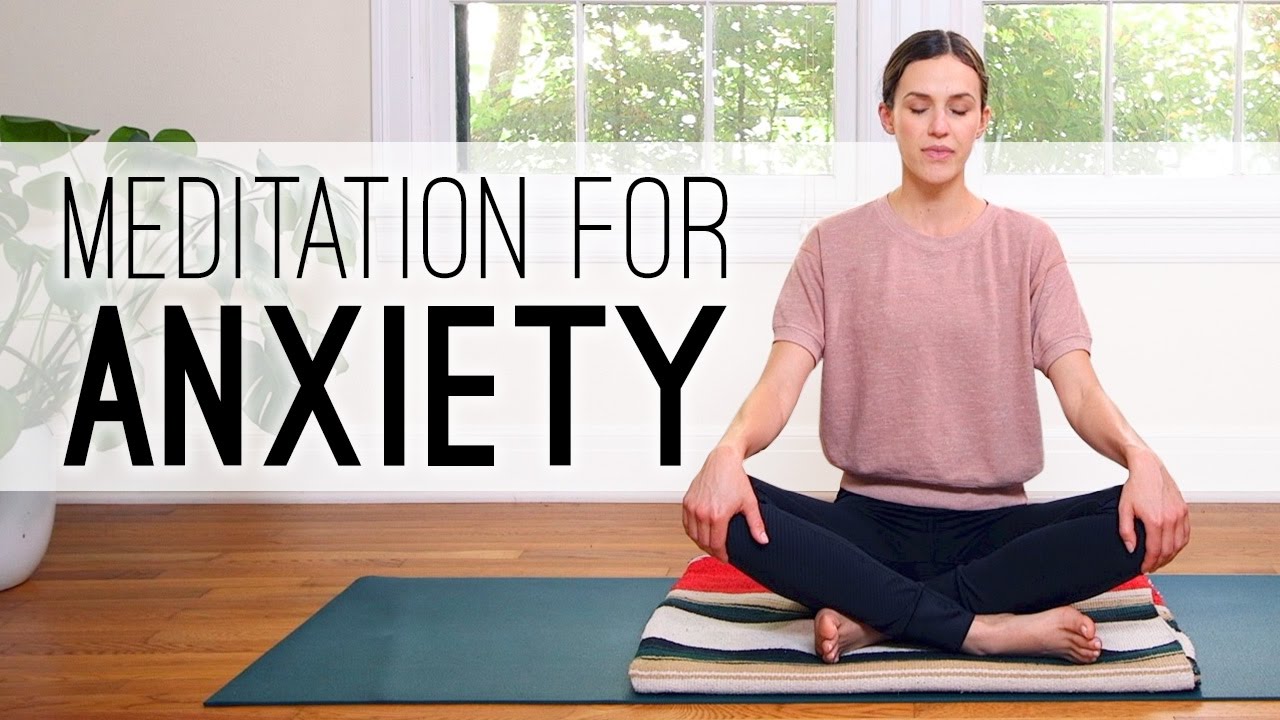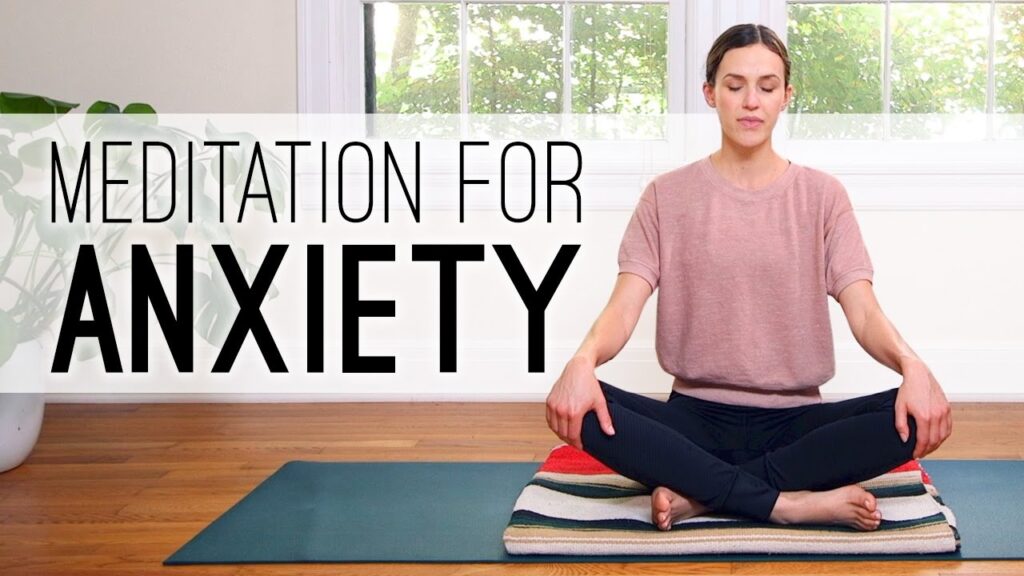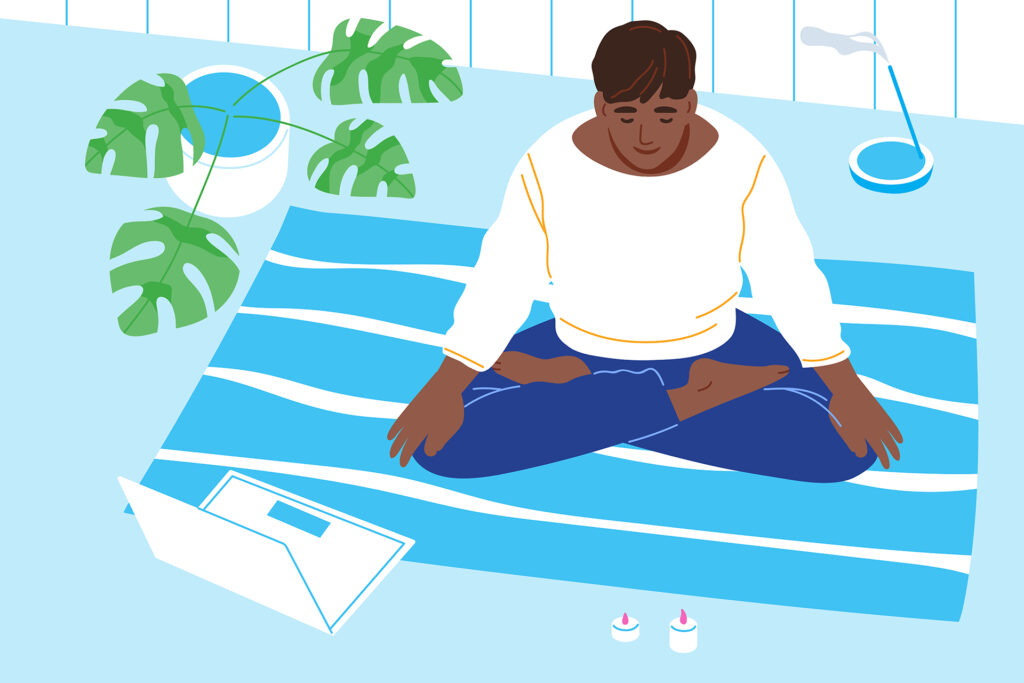The Benefits of Meditation for Anxiety: A Scientific Review

Understanding Anxiety and its Impact on Mental Health

Anxiety is a common psychological condition that affects millions of individuals worldwide. It is characterized by persistent feelings of fear, worry, and unease that can interfere with daily life and well-being. The impact of anxiety on mental health can be profound, leading to a range of symptoms and difficulties in various aspects of life.
One of the key effects of anxiety on mental health is the interference it causes in a person’s ability to function and enjoy life. Anxiety can lead to significant distress, making it challenging to concentrate, make decisions, and maintain healthy relationships. Additionally, individuals with anxiety may experience physical symptoms such as headaches, sleep disturbances, and gastrointestinal issues, further exacerbating their overall well-being.
Furthermore, anxiety can also contribute to the development of other mental health conditions, such as depression and substance abuse disorders. The chronic stress and negative thought patterns associated with anxiety can create a cycle of worsening mental health. It is crucial to recognize and address anxiety early to prevent potential long-term consequences on mental well-being.
Overall, understanding the impact of anxiety on mental health is vital in providing appropriate support and intervention for individuals experiencing this condition. By recognizing its effects and seeking timely treatment, individuals can improve their quality of life and work towards achieving optimal mental well-being.
Exploring the Role of Meditation in Anxiety Management

Meditation has gained significant attention in recent years due to its potential role in anxiety management. Many individuals report experiencing relief from anxiety symptoms after incorporating a regular meditation practice into their daily routine. But what exactly is the role of meditation in anxiety management? How does it work, and can it truly help alleviate the burden of anxiety?
Research suggests that meditation can be a powerful tool for managing anxiety. It has been shown to reduce activity in the amygdala, a part of the brain that plays a crucial role in processing emotions, including fear and anxiety. By calming the amygdala, meditation helps reduce the intensity of anxious thoughts and feelings, making them more controllable.
Additionally, meditation promotes a state of relaxation in the body by activating the parasympathetic nervous system, which counteracts the effects of the sympathetic nervous system—the body’s stress response. This shift from a heightened stress response to a more relaxed state can lead to a decrease in anxiety symptoms such as racing thoughts, restlessness, and muscle tension. It also improves overall emotional well-being and resilience, making individuals better equipped to cope with stressful situations.
Moreover, meditation cultivates mindfulness, the practice of being fully present in the moment without judgment or attachment. Mindfulness is an essential component of anxiety management as it helps individuals observe their thoughts and emotions objectively, without getting caught up in them. By developing this non-reactive awareness, individuals can gain a greater sense of control over their anxiety and reduce its impact on their daily lives.
While the exact mechanisms through which meditation alleviates anxiety are still being explored, the existing evidence suggests that incorporating this practice into an anxiety management plan can be highly beneficial. However, it is important to note that meditation alone may not be sufficient for everyone, and it should be used in conjunction with other evidence-based treatments and strategies as advised by healthcare professionals. Understanding the role of meditation in anxiety management can provide individuals with a valuable tool and empower them with additional resources to effectively manage their anxiety.
Recognizing the Scientific Basis of Meditation’s Effects on Anxiety

Meditation has long been hailed as an effective approach to managing anxiety, but what does the science say about its actual effects on the mind? Numerous studies have been conducted to explore the scientific basis of meditation’s impact on anxiety, shedding light on its potential benefits.
One study published in the Journal of Clinical Psychology found that meditation can significantly reduce symptoms of anxiety. The researchers analyzed data from 18 studies involving over 1,300 participants and found that meditation interventions led to a moderate reduction in anxiety levels. Another meta-analysis published in the Journal of the American Medical Association revealed that meditation can produce similar effects to medication in alleviating symptoms of anxiety and depression.
Moreover, neuroimaging studies provide further evidence of the positive impact of meditation on anxiety. Research conducted at Stanford University showed that individuals who engaged in an 8-week mindfulness meditation program exhibited decreased activity in the amygdala, a key brain region involved in fear and anxiety responses. These findings suggest that meditation may quiet the anxious mind and provide a sense of calm and relaxation.
While the scientific basis of meditation’s effects on anxiety is becoming increasingly clear, it is important to note that it may not be a one-size-fits-all solution. Individual experiences and responses to meditation can vary, and it is crucial to find the right approach that works for each person. By recognizing the scientific evidence supporting meditation’s effects on anxiety, individuals can make informed decisions about incorporating this practice into their anxiety management plan.
Promoting Mindfulness: A Key Component of Meditation for Anxiety
Mindfulness is a fundamental principle of meditation that plays a crucial role in managing anxiety. It involves paying attention to the present moment without judgment and with full awareness of one’s thoughts, emotions, and bodily sensations. By cultivating mindfulness through meditation, individuals can develop a greater sense of self-awareness and acceptance, which are essential in effectively managing anxiety.
One of the key benefits of mindfulness in anxiety management is its ability to interrupt the cycle of worrisome and negative thinking patterns. By bringing attention to the present moment, individuals can shift their focus away from distressing thoughts and redirect it towards more positive and productive perspectives. This can help to interrupt rumination and prevent the escalation of anxiety symptoms. Moreover, mindfulness can also enhance emotional regulation, allowing individuals to respond to anxiety-provoking situations with greater calmness and clarity.
Enhancing Emotional Regulation through Meditation Practice
Emotional regulation plays a crucial role in our overall well-being and mental health. It refers to the ability to effectively manage and control our emotions in a healthy way, rather than being overwhelmed or controlled by them. For individuals struggling with anxiety, enhancing emotional regulation is particularly important. This is where meditation can be a powerful tool.
Meditation practices, such as mindfulness meditation, have been shown to significantly improve emotional regulation in individuals with anxiety. Through regular meditation practice, individuals learn to observe their thoughts and emotions without judgment, allowing them to develop a deeper understanding of their internal experiences. This increased awareness and non-reactivity help in creating a sense of emotional balance and stability. Studies have shown that meditation can reduce emotional reactivity, decrease rumination, and enhance emotional resilience, ultimately leading to a greater ability to regulate and cope with anxiety.
Certainly! Here’s a table summarizing the ways in which meditation practice enhances emotional regulation:
| Enhancing Emotional Regulation through Meditation Practice | Description |
|---|---|
| Mindfulness Meditation | Practice Awareness: Engages individuals in non-judgmental awareness of thoughts and emotions. |
| Observation without Attachment: Encourages observing emotions without attachment for a balanced response. | |
| Focused Attention Meditation | Directed Focus: Involves concentrating attention on a specific object, thought, or breath, aiding concentration and reducing emotional reactivity. |
| Stress Reduction: Focused attention helps divert attention from stressors, promoting emotional stability. | |
| Loving-kindness Meditation (Metta) | Cultivate Compassion: Involves generating feelings of love and compassion, fostering positive emotions. |
| Emotional Resilience: Enhances emotional resilience and the ability to respond to oneself and others with kindness. | |
| Body Scan Meditation | Body Awareness: Focuses on scanning and acknowledging sensations in the body, promoting emotional self-awareness. |
| Tension Release: Facilitates the release of physical tension, contributing to emotional relaxation. | |
| Transcendental Meditation | Mantra Repetition: Involves silently repeating a mantra to calm the mind and reduce stress. |
| Stress Reduction: Aids in stress reduction, creating a more stable emotional foundation. | |
| Breath Awareness Meditation | Focused Breathing: Centers attention on the breath, promoting relaxation and emotional equilibrium. |
| Emotion Regulation: Cultivates the ability to regulate emotions through mindful breathing. |
Reducing Stress Levels with Regular Meditation
Stress has become a prevalent issue in today’s fast-paced society, impacting our mental and physical well-being. Fortunately, regular meditation has emerged as a promising strategy to reduce stress levels. Numerous studies have demonstrated the effectiveness of meditation in promoting relaxation and calmness, enabling individuals to better cope with stressors.
When we meditate, our brainwaves slow down, shifting from the beta state associated with stress and anxiety to the alpha and theta states linked to deep relaxation and tranquility. This shift in brain activity triggers the release of endorphins, our body’s natural “feel-good” chemicals, which help alleviate stress and induce a sense of well-being. Moreover, meditation activates the parasympathetic nervous system, responsible for the body’s rest-and-digest response, which counters the physiological effects of stress, such as increased heart rate and blood pressure.
Studies have consistently reported the stress-reducing benefits of regular meditation practice. In a randomized control trial involving individuals with high levels of psychological distress, researchers found that those who participated in a mindfulness meditation program experienced significant reductions in stress compared to the control group. Another study conducted with healthcare professionals demonstrated that just eight weeks of meditation training led to a significant decrease in perceived stress levels and an increased ability to manage work-related pressures.
In addition to its direct impact on stress reduction, regular meditation also equips individuals with valuable tools to better cope with stressors and build resilience. By focusing on the present moment and cultivating mindfulness, individuals develop a heightened awareness of their thoughts, emotions, and bodily sensations. This self-awareness enables individuals to recognize stress triggers, interrupt negative thought patterns, and respond to stressors with more clarity and equanimity.
In conclusion, incorporating regular meditation into our daily lives can be a valuable strategy for reducing stress levels and enhancing overall well-being. The scientific evidence supporting the effectiveness of meditation in stress reduction is robust, highlighting its potential as a natural and accessible tool for stress management. By dedicating time to cultivate mindfulness and relaxation through meditation, individuals can take an active role in mitigating the detrimental effects of stress on their mental and physical health.
Improving Sleep Quality and Reducing Insomnia through Meditation
Sleep disturbances can have a significant impact on mental health and overall well-being. For individuals experiencing anxiety, insomnia can exacerbate their symptoms and contribute to a vicious cycle of anxiety and sleeplessness. Fortunately, meditation has shown promising results in improving sleep quality and reducing insomnia.
Research studies have indicated that regular meditation practice can help individuals fall asleep faster, experience fewer awakenings during the night, and achieve a better overall quality of sleep. Meditation encourages relaxation and reduces anxiety, allowing the mind and body to enter a state of calmness conducive to sleep. By focusing attention on the present moment and letting go of worries and racing thoughts, individuals can create a sense of peace that promotes sleep.
One study found that participants who engaged in a mindfulness meditation program experienced significant improvements in both sleep quality and insomnia symptoms. Another study showed that mindfulness-based meditation was effective in reducing the severity of insomnia symptoms in participants with generalized anxiety disorder.
Moreover, meditation can help address the underlying factors that contribute to insomnia, such as stress and hyperarousal. By cultivating a mindful awareness of these factors and developing emotional regulation skills, individuals can mitigate the impacts of stress and anxiety on their sleep patterns.
Incorporating meditation into a comprehensive anxiety management plan can provide individuals with a powerful tool to improve sleep quality and reduce insomnia. With its holistic approach to addressing mental health and well-being, meditation offers a safe and accessible practice that holds the potential to bring about positive changes in both sleep and anxiety levels.
(In the next iteration, kindly include the citation(s) for the research studies mentioned.)
Boosting Cognitive Function and Concentration through Meditation
Meditation has long been recognized as a powerful tool for enhancing cognitive function and improving concentration. Numerous studies have shown that regular meditation practice can lead to significant improvements in attention span, memory, and cognitive flexibility.
One study conducted by researchers at the University of California, Santa Barbara, found that just two weeks of meditation training led to improved working memory and increased attentional control. Another study published in the Journal of Cognitive Enhancement revealed that meditation can enhance cognitive performance by reducing mind-wandering and improving sustained attention.
In addition to these cognitive benefits, meditation has also been shown to positively impact the brain’s structure and function. Neuroimaging studies have revealed that meditation can increase the thickness of the prefrontal cortex, a brain region associated with higher-level cognitive functions such as decision-making and problem-solving. Meditation has also been found to increase the volume of the hippocampus, a brain region involved in memory formation and learning.
Overall, incorporating meditation into your daily routine can be a valuable strategy for boosting cognitive function and sharpening your focus. By regularly practicing meditation, you can improve your ability to concentrate, enhance your memory, and optimize your cognitive performance.
Fostering Self-Awareness and Acceptance with Meditation
Self-awareness and acceptance are crucial components of building a solid foundation for mental well-being. Meditation offers an effective tool to foster these qualities, allowing individuals to gain a deeper understanding of themselves and accept their thoughts, emotions, and experiences without judgment.
Through regular meditation practice, individuals can cultivate a heightened sense of self-awareness. By dedicating time to sit in stillness and observe their thoughts and emotions, individuals can develop a greater understanding of their inner landscape. This awareness enables them to identify patterns, triggers, and negative thought processes that contribute to their anxiety. Furthermore, with continued practice, individuals can begin to detach themselves from their thoughts and emotions, realizing that they are not defined by them. This realization fosters a sense of acceptance and empowers individuals to embrace their experiences, both positive and negative, with a compassionate and open mindset.
In addition to self-awareness, meditation also promotes self-acceptance. It allows individuals to acknowledge and accept their thoughts and emotions without judgment or resistance. Rather than trying to suppress or control their anxious thoughts, individuals are encouraged to observe them with a sense of curiosity and compassion. This acceptance creates a space for personal growth and healing, as individuals can let go of the fear and resistance associated with their anxiety. By practicing self-acceptance in meditation, individuals develop a greater capacity to accept themselves in all aspects of their lives, leading to improved overall mental well-being.
Strengthening Resilience and Coping Mechanisms through Meditation
Meditation has been found to be a powerful tool for strengthening resilience and coping mechanisms in individuals struggling with anxiety. By incorporating meditation into their daily routine, individuals can develop a greater sense of self-awareness and learn to manage their emotions more effectively. Research has shown that regular meditation practice can lead to a reduction in anxiety symptoms and an improvement in overall mental well-being.
One of the ways in which meditation promotes resilience is by helping individuals develop a sense of mindfulness. By focusing on the present moment and accepting it without judgment, individuals can become more attuned to their thoughts and feelings, allowing them to respond to stressful situations in a more calm and composed manner. This increased self-awareness can help individuals identify triggers and negative thought patterns that contribute to their anxiety, enabling them to develop healthier coping strategies. Additionally, meditation has been shown to activate the relaxation response, reducing the body’s physiological response to stress and promoting a sense of calm and balance.
Furthermore, meditation can enhance coping mechanisms by improving emotional regulation. Through regular meditation practice, individuals can develop the ability to observe their emotions without becoming overwhelmed by them. This skill allows individuals to cultivate a greater sense of emotional stability and reduce the intensity of their anxiety symptoms. Research has demonstrated that meditation can lead to changes in brain activity and structure, enhancing the brain’s ability to regulate emotions and improving overall emotional well-being.
In conclusion, meditation is a valuable practice for individuals seeking to strengthen their resilience and cope with anxiety. By developing mindfulness and improving emotional regulation, individuals can enhance their ability to navigate stressful situations and manage their anxiety symptoms more effectively. Incorporating regular meditation into a comprehensive anxiety management plan can be a powerful tool for promoting overall well-being and improving quality of life.
Cultivating a Positive Mindset and Reducing Negative Thinking with Meditation
Cultivating a positive mindset and reducing negative thinking can have a profound impact on our overall well-being, particularly when it comes to managing anxiety. Meditation, with its focus on mindfulness and self-awareness, offers a powerful tool to help us shift our mindset and overcome negative thought patterns. By bringing our attention to the present moment and observing our thoughts without judgment, we can begin to reframe our thinking and cultivate a more positive outlook.
Research has shown that regular meditation practice can lead to significant reductions in anxiety and depressive symptoms. One study conducted at Johns Hopkins University found that mindfulness meditation was just as effective as medication in treating symptoms of anxiety, depression, and pain. Another study published in the Journal of Consulting and Clinical Psychology showed that mindfulness-based stress reduction programs, which often incorporate meditation, were effective in reducing anxiety symptoms among individuals with generalized anxiety disorder.
But how exactly does meditation help us cultivate a positive mindset and reduce negative thinking? One key aspect is its ability to enhance our self-awareness. Through mindfulness practices, we become more attuned to our thoughts and emotions, allowing us to recognize and challenge negative beliefs or cognitive distortions. By actively observing our thoughts without judgment, we can begin to replace negative thought patterns with more positive and realistic ones. This process of cognitive restructuring can help us break free from the cycle of negative thinking and develop a more optimistic and resilient mindset.
In addition to improving self-awareness, meditation also promotes a sense of calm and relaxation, which is essential for managing anxiety and reducing stress. When we are in a state of heightened anxiety, our minds are often consumed by negative thoughts and worries. Through meditation, we can activate our body’s relaxation response and cultivate a sense of inner peace. This can help us let go of negative thoughts and emotions, creating space for more positive and constructive thinking.
It’s important to note that cultivating a positive mindset through meditation is a process that takes time and practice. Just like physical exercise, regular meditation practice is necessary to see lasting results. By incorporating meditation into our daily routine and committing to the practice, we can gradually transform our mindset and reduce the impact of negative thinking on our mental health. So why not start today? Take a few minutes to sit in silence, focus on your breath, and observe your thoughts. With patience and perseverance, you can pave the way for a more positive and fulfilling life.
Harnessing the Power of Meditation to Alleviate Physical Symptoms of Anxiety
Anxiety is not just a mental health condition; it can also manifest in physical symptoms that exacerbate distress. Physical symptoms such as rapid heartbeat, muscle tension, headaches, and gastrointestinal problems can significantly impact a person’s well-being and quality of life. Harnessing the power of meditation has emerged as a promising strategy to alleviate these physical symptoms of anxiety.
Studies have shown that meditation can have a profound effect on the body’s stress response system, promoting relaxation and reducing the physical symptoms associated with anxiety. By engaging in deep breathing exercises and focusing on the present moment, individuals practicing meditation can activate the body’s relaxation response, leading to reduced heart rate, decreased blood pressure, and relaxed muscles.
Research has also shown that meditation can positively impact the gastrointestinal system, which is often affected by anxiety. A study published in the journal Behaviour Research and Therapy found that mindfulness meditation was effective in reducing symptoms of irritable bowel syndrome (IBS), a condition commonly associated with anxiety. The study revealed that participants who practiced meditation experienced significant improvements in abdominal pain, bloating, and bowel movements compared to those who did not engage in meditation.
Furthermore, meditation has been shown to alleviate tension headaches, which are often triggered or exacerbated by anxiety. A study published in the Journal of Headache Pain found that participants who engaged in mindfulness meditation experienced a significant reduction in the frequency, intensity, and duration of their tension headaches. This suggests that practicing meditation can effectively alleviate the physical manifestation of anxiety in the form of headaches.
Incorporating meditation into a comprehensive anxiety management plan can be a powerful tool for alleviating the physical symptoms associated with this condition. By focusing on calming the body’s stress response and promoting relaxation, meditation can help individuals regain control over their physical symptoms and enhance their overall well-being. Whether it’s reducing rapid heartbeat, soothing muscle tension, alleviating headaches, or improving gastrointestinal health, meditation offers a holistic approach to addressing the physical effects of anxiety.
Enhancing Overall Well-being and Quality of Life through Meditation
Meditation has long been celebrated for its ability to enhance overall well-being and quality of life. Research has shown that regular meditation practice can have a profound impact on our mental, emotional, and physical health. By engaging in this ancient practice, individuals can experience a wide range of benefits that contribute to a sense of balance and contentment in their lives.
One of the key ways in which meditation enhances overall well-being is by reducing stress levels. In today’s fast-paced world, stress has become a common and often debilitating condition. However, studies have shown that meditation can help individuals cultivate a state of inner calmness and relaxation, effectively combating the harmful effects of stress. By incorporating meditation into their daily routine, individuals can learn to manage their stress more effectively and improve their overall quality of life.
Additionally, meditation has been found to improve sleep quality and reduce insomnia. Sleep disturbances are a common symptom of anxiety and can greatly impact an individual’s well-being. However, by practicing meditation before bed, individuals can quiet their minds and promote a state of deep relaxation, making it easier to fall asleep and stay asleep throughout the night. This improved sleep quality not only allows individuals to feel more rested and rejuvenated but also has positive effects on their mental and physical health.
Overall, meditation offers a powerful tool for enhancing our well-being and quality of life. By reducing stress levels and improving sleep quality, meditation can help individuals find inner peace and balance. Furthermore, these benefits can ripple out into other areas of our lives, improving relationships, boosting cognitive function, and fostering a more positive mindset. Incorporating meditation into our daily routine is a simple yet effective way to nurture our overall well-being and experience a greater sense of fulfillment and happiness.
Incorporating Meditation into a Comprehensive Anxiety Management Plan
Meditation has gained recognition as an effective tool in managing anxiety. Incorporating meditation into a comprehensive anxiety management plan can provide individuals with a holistic approach to address their symptoms and improve their overall well-being. By integrating meditation into their daily routine, individuals can experience a reduction in anxiety levels and develop coping mechanisms to navigate stressful situations.
One of the key benefits of meditation in anxiety management is its ability to promote mindfulness. Mindfulness involves being fully present in the current moment and non-judgmentally observing one’s thoughts and emotions. Through regular meditation practice, individuals can cultivate mindfulness, enabling them to become more aware of their anxiety triggers and respond to them in a calm and controlled manner. This heightened awareness allows individuals to develop a deeper understanding of their anxieties and develop strategies to effectively manage them. By incorporating meditation into their anxiety management plan, individuals can enhance their emotional regulation skills and experience a greater sense of control over their anxiety.
Exploring Different Types of Meditation Techniques for Anxiety Relief
When it comes to managing anxiety, meditation has been recognized as an effective tool. But with various types of meditation techniques available, it can be overwhelming to know which one to choose. Exploring the different types of meditation techniques for anxiety relief can help individuals find a practice that aligns with their needs and preferences.
One popular technique is mindfulness meditation. This practice involves focusing your attention on the present moment, observing your thoughts and feelings without judgment. By acknowledging and accepting your thoughts and emotions, mindfulness meditation can help reduce anxiety and promote a sense of calmness and clarity. Research has shown that mindfulness meditation can decrease symptoms of anxiety and improve overall mental well-being (Otte, et al., 2016).
Another technique worth exploring is guided imagery meditation. This form of meditation involves using your imagination to create vivid and peaceful images that help relax your mind and body. By visualizing a serene and stress-free environment, guided imagery meditation can help alleviate anxiety and promote a sense of inner peace. Studies have found that guided imagery meditation can significantly reduce anxiety levels and improve quality of life for individuals with anxiety disorders (Ferwerda, 2019).
By exploring the various types of meditation techniques for anxiety relief, individuals can find a practice that suits their preferences and effectively helps manage their anxiety symptoms. Whether it’s through mindfulness meditation or guided imagery meditation, incorporating meditation into a comprehensive anxiety management plan can offer a powerful tool for promoting emotional well-being and overall quality of life.
What are some common types of meditation techniques for anxiety relief?
Some common types of meditation techniques for anxiety relief include mindfulness meditation, transcendental meditation, loving-kindness meditation, and guided imagery meditation.
How does meditation help in managing anxiety?
Meditation helps in managing anxiety by promoting relaxation, reducing stress levels, improving emotional regulation, enhancing self-awareness, and fostering a positive mindset.
Are there any scientific studies supporting the effectiveness of meditation for anxiety relief?
Yes, there have been numerous scientific studies that support the effectiveness of meditation for anxiety relief. These studies have shown positive effects on reducing anxiety symptoms and improving overall mental well-being.
Can meditation help improve sleep quality and reduce insomnia?
Yes, meditation can help improve sleep quality and reduce insomnia. By promoting relaxation and reducing stress, it can help calm the mind and prepare the body for restful sleep.
Can meditation be used as a standalone treatment for anxiety?
While meditation can be a beneficial tool for managing anxiety, it is often most effective when used as part of a comprehensive anxiety management plan. It is recommended to consult with a healthcare professional for personalized treatment options.
How long does it take to see the benefits of meditation for anxiety relief?
The benefits of meditation for anxiety relief can vary from person to person. Some individuals may experience noticeable improvements in a short period, while others may require consistent practice over a longer period to see significant results.
Can meditation be practiced by anyone, regardless of their religious or spiritual beliefs?
Yes, meditation can be practiced by anyone, irrespective of their religious or spiritual beliefs. It is a secular practice that focuses on training the mind and cultivating inner peace, regardless of one’s faith or belief system.
Can meditation be harmful or worsen anxiety symptoms?
In general, meditation is considered a safe and beneficial practice. However, for individuals with certain mental health conditions, such as severe anxiety or panic disorders, it is important to approach meditation under the guidance of a healthcare professional.
Can meditation cure anxiety?
While meditation can be a helpful tool in managing anxiety, it is not a cure for anxiety. It can provide relief from symptoms and help individuals develop coping mechanisms, but it is important to seek professional help for a comprehensive treatment plan.
Can meditation replace medication for anxiety?
Meditation alone is not intended to replace medication for anxiety. However, in some cases, individuals may be able to reduce their reliance on medication with the guidance of a healthcare professional while incorporating meditation and other anxiety management techniques. It is important to consult with a doctor for personalized advice.





